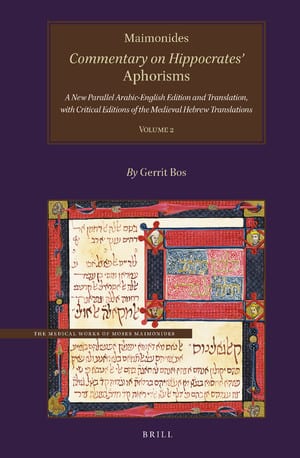
Many years ago now, with Gerrit Bos, who is now Professor Emeritus of Jewish Studies at the University of Cologne, in Germany, I launched the publication of a series of “The Medical Works of Moses Maimonides” as part of what was then called the Middle Eastern Texts Initiative (METI), based at Brigham Young University and under the auspices of the Neal A. Maxwell Institute for Religious Scholarship..
In subsequent years, I was drop-kicked out the door of the Maxwell Institute and METI was eventually handed over to E. J. Brill, in the Netherlands.
I’m pleased, though, that the series that I conceived continues to bear rich fruit. And, happily, under the terms that my then-dean negotiated on my behalf, two copies of each new volume are sent to me in perpetuity by the Maxwell Institute.
Today, for example, I received in the mail two copies each of two new volumes in the Maimonides series:
Here’s a helpful paragraph taken from the description on the Brill website:
Hippocrates’ Aphorisms enjoyed great popularity in the ancient and medieval world and, according to Maimonides, it was Hippocrates’ most useful work as it contained aphorisms, which every physician should know by heart. They were translated into Hebrew several times, but it was Maimonides’ Commentary on Hippocrates’ Aphorisms that made the work influential in Jewish circles. For the composition of his commentary, Maimonides consulted the Aphorisms through the commentary by Galen, translated by Ḥunayn ibn Isḥāq. This edition of Maimonides’ Arabic commentary and its Hebrew translations, the first with an English translation based on the Arabic text, is part of a project undertaken by Gerrit Bos to critically edit Maimonides’ medical works.
Somewhat to my surprise, I continue to be featured in the front matter of the books as the “Founding Editor” of the series. I had expected, frankly, to be flushed down the memory hole, turned into a “non-person.” Not so, though. Thanks to John Rosenberg, my dean at the time of the Purge.












